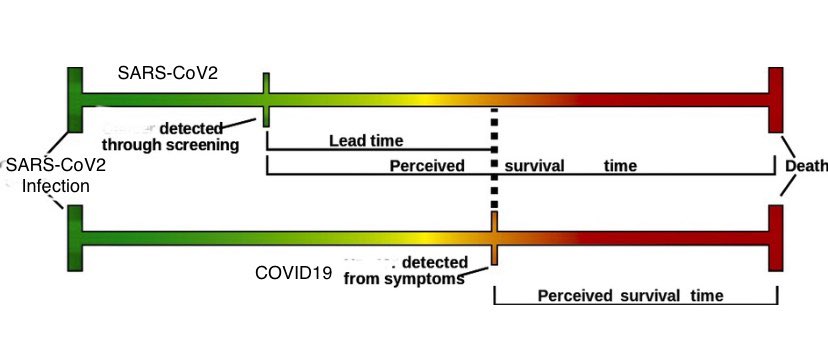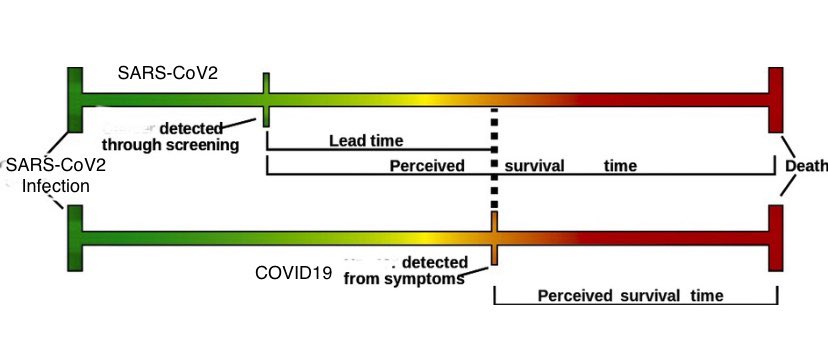THINK LIKE AN EPIDEMIOLOGIST: why are COVID deaths *still* not going up 3 weeks after case counts started increasing? There are many possible explanations, but one I haven’t seen mentioned is the impact of widespread testing on *early detection*.
A #tweetorial on LEAD TIME BIAS.
A #tweetorial on LEAD TIME BIAS.
Have you heard of LEAD TIME BIAS before? This sneaky little bias creeps in whenever we make changes to testing protocols and can make it difficult to assess what works and what doesnt.
For #COVID19, lead time bias is probably contributing to the lag between cases and deaths.
For #COVID19, lead time bias is probably contributing to the lag between cases and deaths.
If you have heard of lead time bias, it’s probably in the context of screening programs, like mammograms, colonoscopies, etc.
The idea is that when you start actively screening for cancers, you end up diagnosing people *before* they would normally have been diagnosed.
The idea is that when you start actively screening for cancers, you end up diagnosing people *before* they would normally have been diagnosed.
That extra (lead) time will make it seem like people who get screened live longer than people who don’t get screened, even if screening changes nothing about how their cancer progresses.
This nice graphic from the @Wikipedia page explains it visually https://abs.twimg.com/emoji/v2/... draggable="false" alt="👇🏼" title="Rückhand Zeigefinger nach unten (mittelheller Hautton)" aria-label="Emoji: Rückhand Zeigefinger nach unten (mittelheller Hautton)">
https://abs.twimg.com/emoji/v2/... draggable="false" alt="👇🏼" title="Rückhand Zeigefinger nach unten (mittelheller Hautton)" aria-label="Emoji: Rückhand Zeigefinger nach unten (mittelheller Hautton)">
This nice graphic from the @Wikipedia page explains it visually
What does this have to do with #COVID19? Well, we switched from only testing people who had really serious severe symptoms to testing a much wider group of people with milder or even no symptoms.
Many of the new cases are much earlier in their disease process.
Many of the new cases are much earlier in their disease process.
Lead time bias tells us that we can expect to see a longer delay between detection & death because we are detecting people earlier in the disease process. This does not mean people are surviving longer! That’s the sneaky lead time bias talking!!
But what about using reported symptom onset from cases in Jan, Feb, & March? Well for one thing, we’ve learned a TON about what things even count as symptoms. For example, no one asked in January about your sense of smell!
For another thing, people have a hard time remembering mild symptoms. And people who are in the ICU on a ventilator are gonna have a real hard time reporting early mild symptoms.
(See: recall bias)
(See: recall bias)
In lots of cases, the family of people who were hospitalized or died may have been the ones asked to report when the earliest symptoms started.
Do you always tell everyone you live with about every ache & pain?
(See: proxy respondent bias)
Do you always tell everyone you live with about every ache & pain?
(See: proxy respondent bias)
I could get side tracked into even more biases but it’s late & im tired so let’s recap:
When you start identifying people at earlier stages of a disease, it looks like they survive longer (or have the disease longer) compared to when you identify based on severe symptoms.
When you start identifying people at earlier stages of a disease, it looks like they survive longer (or have the disease longer) compared to when you identify based on severe symptoms.
(PS, shout out to @nataliexdean for coming up with the THINK LIKE AN EPIDEMIOLOGIST tweetorial style)

 Read on Twitter
Read on Twitter
 " title="That extra (lead) time will make it seem like people who get screened live longer than people who don’t get screened, even if screening changes nothing about how their cancer progresses.This nice graphic from the @Wikipedia page explains it visuallyhttps://abs.twimg.com/emoji/v2/... draggable="false" alt="👇🏼" title="Rückhand Zeigefinger nach unten (mittelheller Hautton)" aria-label="Emoji: Rückhand Zeigefinger nach unten (mittelheller Hautton)">" class="img-responsive" style="max-width:100%;"/>
" title="That extra (lead) time will make it seem like people who get screened live longer than people who don’t get screened, even if screening changes nothing about how their cancer progresses.This nice graphic from the @Wikipedia page explains it visuallyhttps://abs.twimg.com/emoji/v2/... draggable="false" alt="👇🏼" title="Rückhand Zeigefinger nach unten (mittelheller Hautton)" aria-label="Emoji: Rückhand Zeigefinger nach unten (mittelheller Hautton)">" class="img-responsive" style="max-width:100%;"/>




